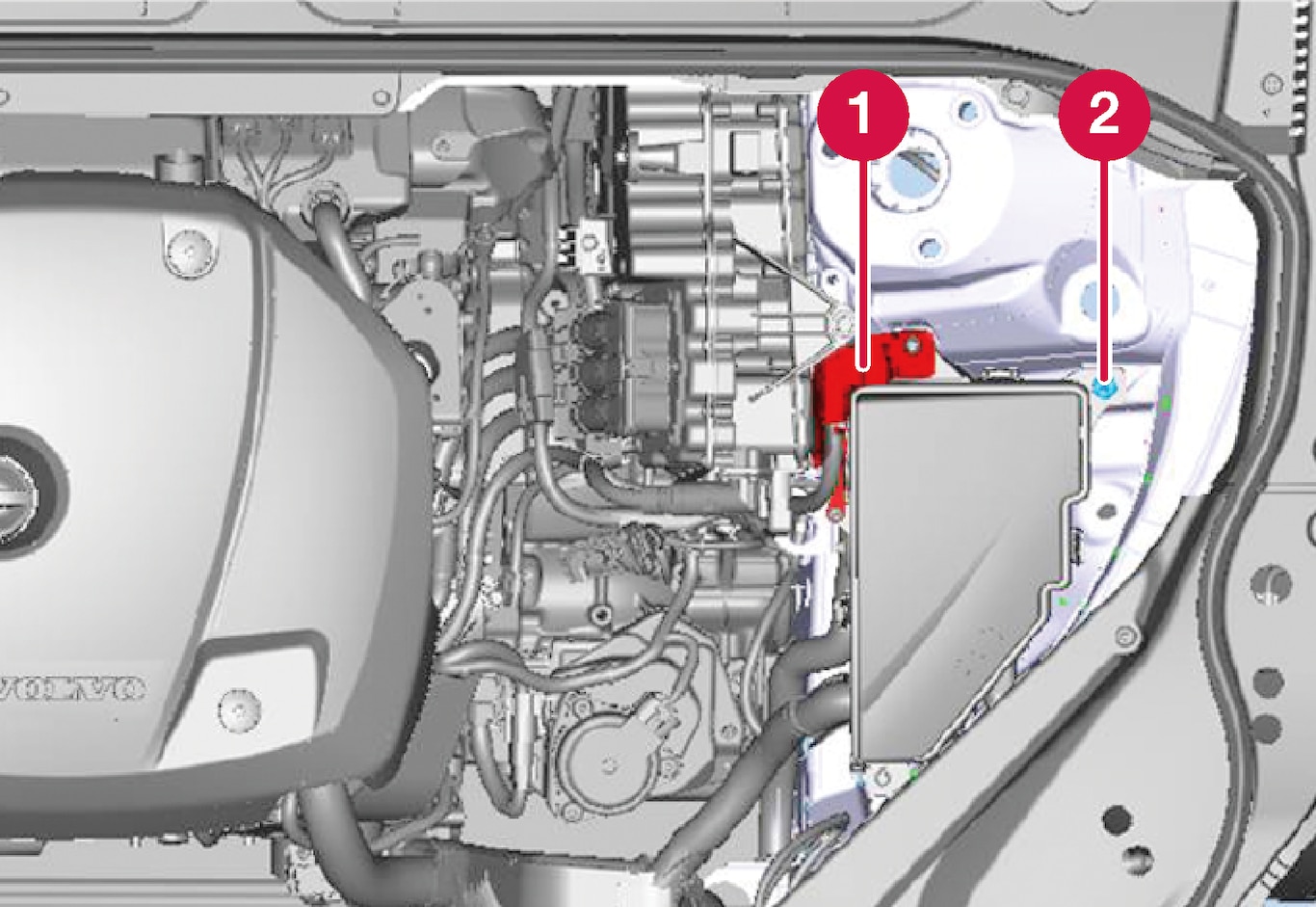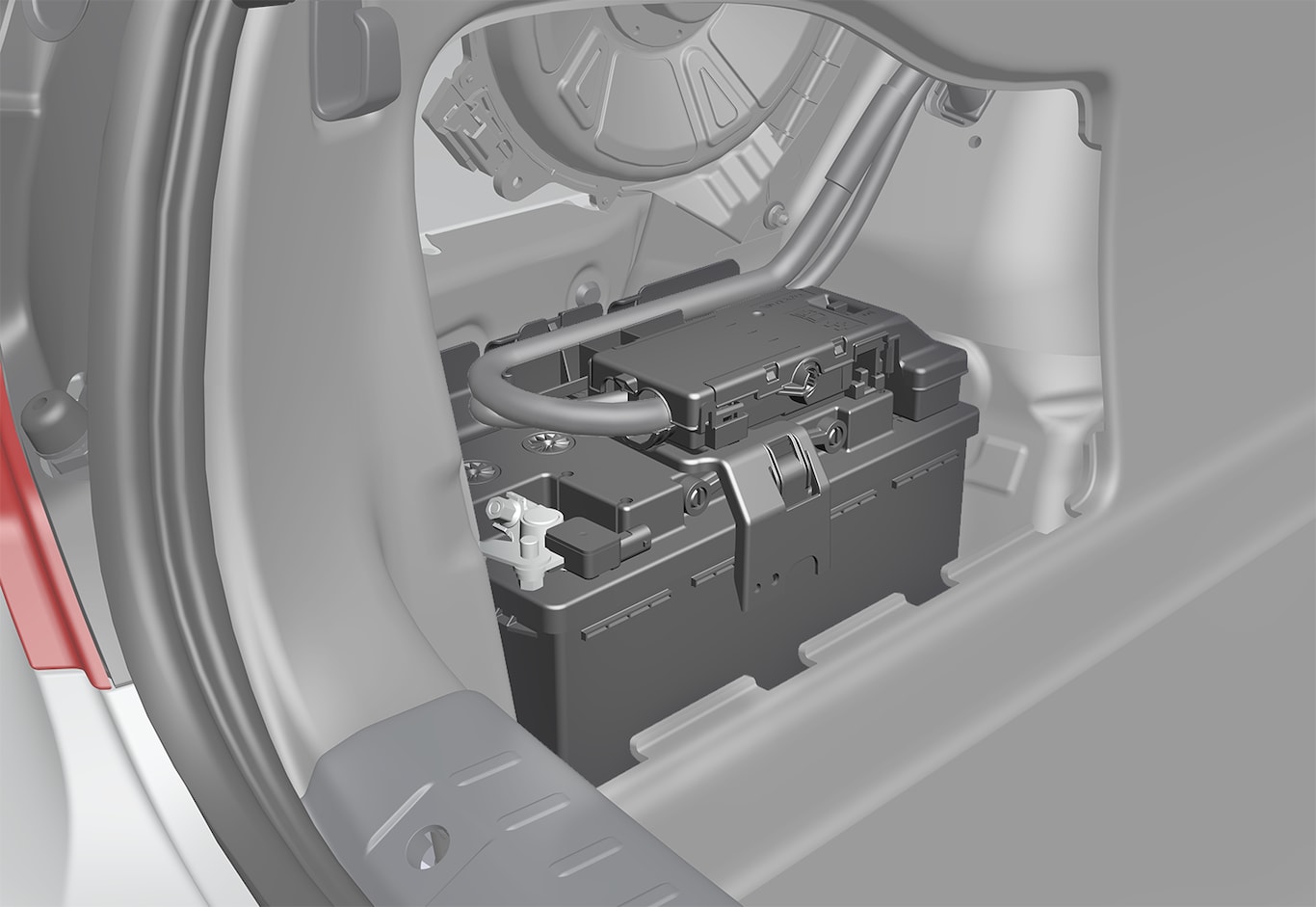Start battery
The vehicle has a single-pole electrical system that uses the chassis and engine mount as conductors.
The start battery is used to start the electrical system and power electrical equipment in the vehicle. The hybrid battery is used to start the combustion engine.
The start battery should only be replaced by a workshop1.
The start battery is a 12 V AGM (Absorbed Glass Mat) battery, dimensioned for regenerative charging and to support the function of the vehicle's various systems.
The service life and performance of the start battery are affected by factors such as driving style, driving conditions, climate, battery discharges, number of starts, etc.
- Never disconnect the start battery while the engine is running.
- Make sure the cables to the start battery are correctly connected and the clamps are securely tightened.
Warning
- Batteries generate hydrogen gas, which is flammable and explosive.
- Do not connect the jumper cable to any part of the fuel system or to any moving parts. Avoid touching hot manifolds.
- Battery fluid contains sulfuric acid. Do not allow battery fluid to contact eyes, skin, fabrics or painted surfaces.
- If contact occurs, flush the affected area immediately with water. Obtain medical help immediately if eyes are affected.
- Never expose the battery to open flame or electric spark. Do not smoke near the battery. Failure to follow the instructions for jump starting can lead to injury.
Connection points
Warning
California Proposition 65
Operating, servicing and maintaining a passenger vehicle can expose you to chemicals including engine exhaust, carbon monoxide, phthalates, and lead, which are known to the State of California to cause cancer and birth defects or other reproductive harm. To minimize exposure, avoid breathing exhaust, do not idle the engine except as necessary, service your vehicle in a well ventilated area and wear gloves or wash your hands frequently when servicing your vehicle. For more information go to www.P65Warnings.ca.gov/passenger-vehicle.
Use the vehicle's connection points in the engine compartment to connect an external start battery or battery charger.
The battery terminals on the car's start battery in the luggage/cargo area must not be used.

 Positive connection point
Positive connection point Negative connection point
Negative connection point
Important
Important
Note
If both the starter battery and the hybrid battery are discharged, both batteries must be charged. In such cases, it is not possible to charge only the hybrid battery first.
The starter battery must have a certain level of charge for it to be possible to charge the hybrid battery.
Important
Failure to observe the following could cause the infotainment energy save mode to temporarily stop working and/or a message in the driver's display regarding the state of charge of the starter battery may be temporarily incorrect after an external starter battery or battery charger has been connected:
- The negative battery terminal of the vehicle's starter battery must never be used to connect an external starter battery or battery charger – only the vehicle's negative charging point should be used as a grounding point.
Note
If the starter battery becomes discharged too many times, it will shorten its service life.
The service life of the starter battery is affected by several factors, such as driving conditions and climate. The starting capacity of the battery reduces gradually over time. The battery must therefore be recharged if the vehicle is not used or a long period of time or if it is only driven short distances. Severe cold further limits the starting capacity.
To keep the starter battery in a good condition, the vehicle should be driven at least 15 minutes per week or the battery should be connected to a battery charger with automatic trickle charging.
A starter battery that is always kept fully charged has the maximum service life.
Location

Warning
Important
Specifications for start battery
Volvo recommends that batteries are replaced by an authorized Volvo workshop.